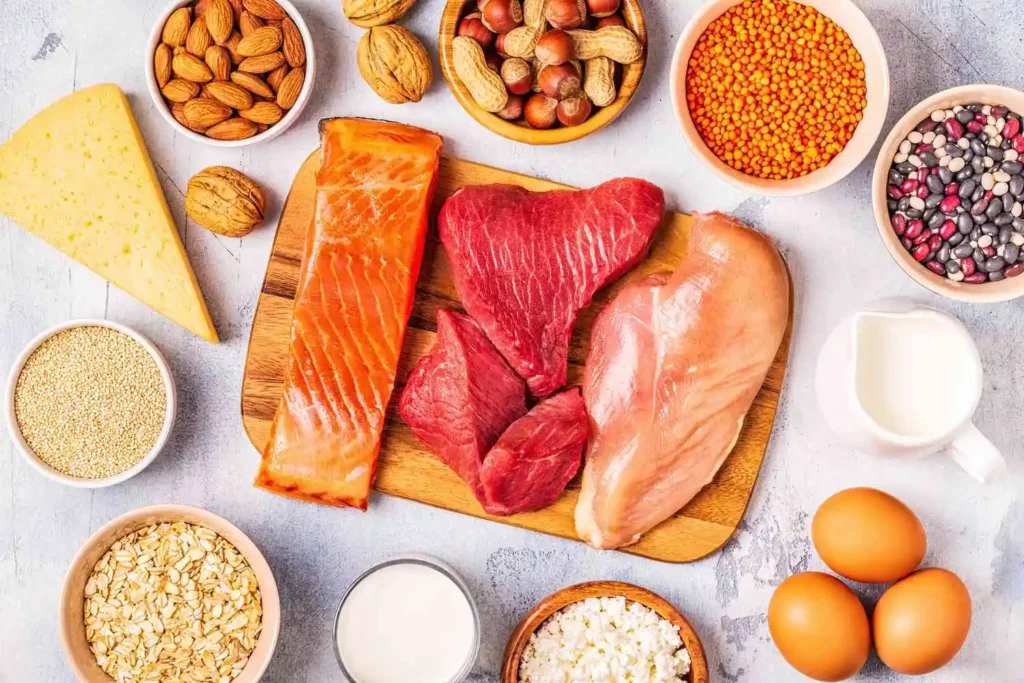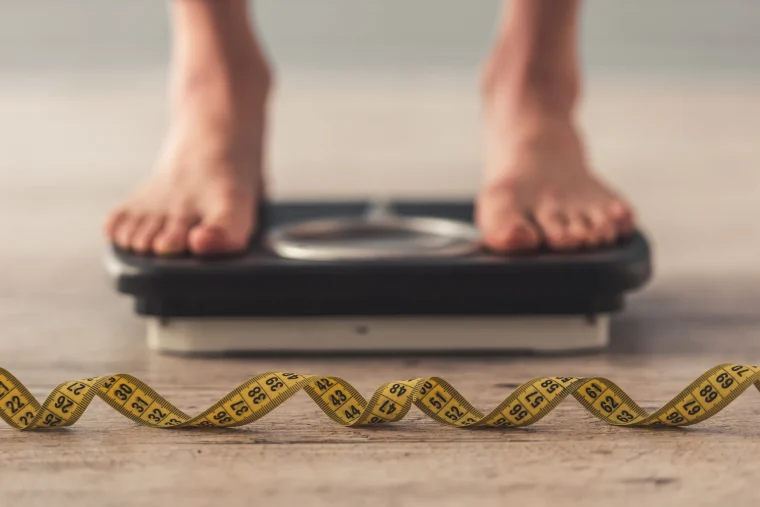Weight Loss vs Fat Loss: The Difference, ExplainedThere are numerous diet regimens available on the internet that claim to help you lose weight quickly. Some people demand a strict diet, while others must eat at specific times. But does lowering weight automatically result in a loss of fat or inches around the waist? There is a distinct scientific distinction between weight loss and fat loss, which we will discuss further below.
What Is Weight Loss?
Weight loss is defined as a decrease in total body weight. This weight contains your body’s muscle, fat, and water.
What Is Fat Loss?
The distinction between weight loss and fat loss necessitates a more in-depth discussion. Weight loss is less specific than fat loss. We can decrease body fat by limiting calories, just like we can lose weight. The quality of food we consume for fat loss is more essential than weight reduction. We must be more explicit about our macronutrient intake, which includes protein, carbohydrates, and fat.

Weight Loss Vs Fat Loss
The distinction between weight loss and fat loss necessitates a more in-depth discussion. Weight loss is less specific than fat loss. We can decrease body fat by limiting calories, just like we can lose weight. The quality of food we consume for fat loss is more essential than weight reduction. We must be more explicit about our macronutrient intake, which includes protein, carbohydrates, and fat.

The goal of successful weight loss vs. fat loss is to keep as much muscle as possible, if not gain some while losing as much body fat as possible. Not the scale, but your body fat percentage is a vital indicator of your progress. In fact, keep away from the scale.
The Focus: Fat Loss, Not Weight Loss
When deciding between weight loss and fat loss, you should prioritize fat loss. Most weight loss plans will help you lose weight, but the majority of it will be water and muscle. And, as previously said, the key to permanently losing weight is to maintain muscle while losing fat. That is why it is critical to grasp the distinction between weight loss and fat loss and to consume a diet and adhere to a regimen that helps keep fat off.

Why You Need To Maintain Healthy Muscle Mass

Reducing muscle has negative consequences because reducing muscle reduces the number of calories you burn at rest, making it simpler to recover any weight you may have lost as fat. The more muscle you have, the more calories you burn, even when you’re sleeping.
Maintaining a healthy muscular percentage has various advantages, including:
- Maintaining healthy fat levels in the blood (triglycerides and cholesterol)
- Regulating healthy blood sugar levels
- Controlling inflammation
A higher fat-to-muscle ratio has been associated with chronic diseases such as metabolic syndrome, heart disease, and diabetes in several studies). It also reduces your chances of developing age-related muscle loss, which can lead to certain problems.
How To Lose Fat While Retaining Muscle
The key to losing fat while keeping (and even developing) muscle in the battle of weight reduction vs fat loss. There are a few basic techniques to ensure that you reduce fat while maintaining or gaining muscle mass:
Protein:
Protein is an essential ingredient for everyone (not just athletes and bodybuilders) and is essential for fat loss. That doesn’t imply you should start consuming protein smoothies on a daily basis. A healthy and balanced diet will provide enough protein for the majority of people. Protein is necessary for bone formation and also participates in metabolic activities, immunological response, cellular repair, blood cell formation, and other processes.
Protein is also needed for muscle maintenance and new muscle growth, especially when decreasing weight. A high-protein diet curbs appetite, allowing you to consume less calories. Protein intake should be between 0.8 and 1.2 grams per kilogram of body weight per day.

Carbohydrates:
Prioritizing protein at meals, however, does not imply avoiding carbohydrates. Breaking up with entire food groups isn’t necessary for losing fat, and there are more viable strategies for keeping the fat off in the long run.
According to research, eating a wide variety of good meals such as fruits and vegetables, whole grains, and lean meats while minimizing processed, sugary foods leads to healthy, sustainable weight loss.

Exercise:
Exercise is the most efficient strategy to lose weight while maintaining muscular mass. Exercise combined with a higher protein intake can help get better results. A minimum of 150 minutes of exercise per week is required. It is critical to maintain metabolism and avoid muscle loss.

We hope this blog has provided you with a better understanding of fat loss and weight loss. If you are seeking a long-term solution to your weight loss vs fat loss issues, you can always contact us to learn more about our weight management program.
FAQs
1. What is the primary distinction between weight loss and fat loss?
Weight loss is defined as a decrease in overall body weight, which can be the result of shedding not only fat but also muscle, water, or bone density. Fat loss, on the other hand, focuses on reducing body fat while maintaining lean muscle mass.
2. What is the significance of distinguishing between weight loss and fat loss?
Understanding the distinction is critical since focusing just on weight loss might result in muscle loss and affect your overall health. In contrast, fat loss promotes a healthier body composition and enhances metabolic health.
3. How can I tell the difference between fat loss and weight loss in my progress tracking?
Track your body composition by calculating your body fat % and weight. This can be accomplished with skinfold calipers, bioelectrical impedance scales, or DEXA scans.
4. Is it possible to lose weight without shedding fat?
Yes, you can lose weight without shedding fat. Crash diets or extreme calorie restriction can result in quick weight loss, although much of it may be muscle and water loss rather than fat loss. This strategy needs to be more sustainable and healthy.
5. What are some effective fat-loss strategies?
A balanced diet with a moderate calorie deficit, regular strength training to preserve muscle mass, and aerobic activity are all effective fat-loss measures. Patience and consistency are essential.
6. Can I lose fat from certain areas of my body, such as my tummy or thighs?
Spot reduction (targeted fat loss in specific locations) is, unfortunately, a misconception. When you create a calorie deficit, fat loss occurs throughout the body. Genetics plays a significant role in determining where your body loses fat first.
7. Can you gain weight while lowering body fat?
Yes, you can gain weight while lowering body fat. When you gain muscle mass, which is denser than fat, this can happen. Muscle gain can compensate for fat loss on the scale, but it also improves body composition.
8. How important is nutrition in fat loss?
Nutrition is very important in fat loss. A well-balanced diet with proper macronutrient ratios and a calorie deficit is required. Whole foods, lean proteins, healthy fats, and complex carbohydrates should be prioritized.
9. How can I avoid muscle loss while on a fat-reduction diet?
Strength training exercises should be done on a regular basis to prevent muscle loss. Consume sufficient protein to maintain muscle maintenance. A progressive and moderate calorie shortage also aids in muscle preservation.
10. How long does it usually take to reduce body fat noticeably?
– The results of fat loss can vary greatly based on factors such as your starting point, food, exercise habits, and genetics. In general, healthy fat loss happens at a pace of 0.5 to 2 pounds each week.
11. What are the health advantages of fat loss over weight loss?
– Fat loss, as opposed to weight loss, is linked to better metabolic health, a lower risk of chronic diseases, better body composition, and greater physical performance.
12. Could you provide me any pointers on how to keep fat reduction going in the long run?
– Maintain your fat reduction by following a balanced and sustainable eating plan, engaging in regular exercise, staying hydrated, getting enough sleep, and effectively managing stress. Extreme dieting should be avoided.
13. Do vitamins or weight loss drugs help with fat loss?
– Fat loss does not require the use of supplements or weight reduction tablets. A well-balanced diet and exercise regimen are the most effective and long-lasting approaches to lose fat.
14. How can I get expert help with my fat loss journey?
– For specialized advice, speak with a licensed dietician or a trained fitness trainer. They can assist you in developing a fat reduction plan that is safe and effective for your specific needs and goals.
15. Is weight loss appropriate for everyone, or are there exceptions?
– Fat loss is generally advantageous for people who have extra body fat. However, it is critical to approach it in a healthy and long-term manner. If you have specific health concerns or medical issues, seek the advice of a healthcare expert.














